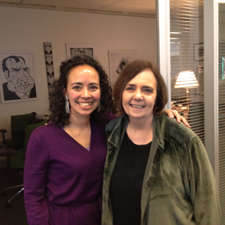NY Times Celebrates Path-Breaking Book; Invites 1199er to Join Panel
February 13, 2013
To view the NY Times panel discussion, and meet the panelist, please visit www.nytimes.com
To celebrate the 50th anniversary of Betty Friedan’s groundbreaking book, "The Feminine Mystique", the New York Times organized a video roundtable, moderated by Gail Collins, renowned author and the first female editor of the New York Times’ editorial page, and featuring among other panelists, Milly Silva, 1199SEIU Executive Vice President for New Jersey.
The panel discussed the advances and setbacks that women have experienced over the past half-century in the struggle to win gender equality at home and in the workplace.
In Friedan’s book, which laid the foundation for a new wave of feminist activism in the 1960s and 1970s, the author condemns the notion that women should be expected to spend their lives at home raising children. Instead, she argues, women should have the same freedom as men to be financially independent, to have successful careers of their own, and to make meaningful contributions to society.
“While women have made tremendous strides in recent decades, the lack of good jobs in today’s economy has made it very difficult for women to achieve Freidan’s vision,” Silva said. “The reality is that women have to do it all and then some. When we think about the situation for healthcare workers, you often have women who walk out of their house every morning and go to someone else’s home to provide care, or they go to a nursing home to care for a senior who has no other family. These women then have to think about what’s happening with their own children and how are they going to juggle two or three jobs in order to make ends meet.”
“The Feminine Mystique” was first published 1963, the same year that 1199 members won an historic victory—securing unionization rights for hospital workers in New York City’s voluntary hospitals. That success shaped 1199 into the powerful union it is today, with more than 350,000 members. The women of that early struggle were working both out of financial necessity and with a deep sense of responsibility to help those in need. Fifty years later, healthcare workers are still fighting for dignity and respect. It is a testament to Friedan’s belief that women must take leadership roles in bringing about positive social change.
Silva said, “Today we are still fighting to create good jobs that can sustain our families and organizing to ensure that our country becomes more equitable and prosperous for all working people. In this spirit, our union continues to be an advocate for the ideals that Betty Freidan and the women and men of 1199 heroically fought for a half-century ago.”


